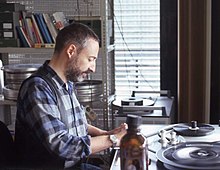Manfred Salzgeber

Manfred Salzgeber (born January 10, 1943 in Łódź , Poland (then Litzmannstadt, German Reich ), † August 12, 1994 in Berlin ) was a German actor and filmmaker . He was head of the Panorama section of the Berlin International Film Festival , co-founder of the International Forum of New Cinema and founder of several companies in the film industry, including the film distributor Edition Salzgeber .
Life
Manfred Salzgeber worked from 1961 to 1962 in the wholesale bookstore Umbreit in Stuttgart. He then completed an apprenticeship as a bookseller in the Friedrich Stahl bookstore in Stuttgart until 1965. From 1965 to 1973 he worked in the Marga Schoeller bookstore in Berlin. Almost at the same time he started volunteering with the then "Friends of the Deutsche Kinemathek e. V. “ , which gradually expanded their monthly events in the studio of the Academy of Arts. He initiated the night shows in the “Bellevue am Hansaplatz” cinema (today the Grips Theater ) and in the summer of 1969 discovered the “Bayreuth Lichtspiele” at Welserstraße 25, which was for sale. Together with Heiner Roß, he organized the purchase of the cinema for the "Friends of the Deutsche Kinemathek eV", who opened it on January 3, 1970 under the name "Arsenal". Until 1973, Salzgeber volunteered in the cinema almost every day.
He is one of the identifying and founding figures of the German gay movement of the 20th century . Together with Wieland Speck, he was a champion for gay and lesbian film art. He played a key role in shaping this term. Discovered by Rosa von Praunheim , he played in 1970's film Not the homosexual is perverse, but rather the situation in which he lives , which triggered a new political gay movement. Salzgeber was particularly committed to gay and lesbian film throughout his life. In 1970, Salzgeber was involved in founding the International Forum of New Films , which at the time was intended as a counter-festival to the Berlinale and began its work in 1971. In 1977 Salzgeber left the “Friends” and the “Forum” after a dispute over a film by Margarethe von Trotta in the “Forum”.
As early as 1973, Salzgeber turned the Bali cinema in Berlin-Zehlendorf into Germany's first art house cinema . The "Yorck Kino" followed in 1974 and the "Tali" (later Moviemento Kino) in 1975. In the German autumn of the mid-1970s, when many intellectuals were targeted by the terrorism dredging , Salzgeber moved to Amsterdam and wrote film reviews for the NRC Handelsblad and Skrien.
In 1979 he was moved to return by Berlinale director Moritz de Hadeln . In 1980 and 1981 he entrusted him with the task of expanding the festival's info show into an independent program section. In 1986 the information show was renamed Panorama . To this day, Salzgeber's thematic course-setting in the panorama program is still alive. Salzgeber and his assistant Wieland Speck created the Teddy Award , which has been awarded to gay and lesbian films shown in the Panorama section since 1987. To this day, the award is the only one of its kind. It celebrated its twentieth anniversary at the 2006 Berlinale. The festival paid homage to the Teddy Award .
In 1985, Salzgeber founded the film distributor edition manfred salzgeber , with which he dedicates himself to a wide range of films that are hardly considered by larger distributors. His focus is on the AIDS issue. Salzgeber became the discoverer of films and filmmakers of the gay and lesbian genre, which have now become classics. Salzgeber died on August 12, 1994 of complications from AIDS. His urn was buried in the St. Matthäus-Kirchhof in Berlin-Schöneberg. The film distributor still has its office in Berlin under the name Salzgeber & Co. Medien GmbH .
Honors
In 1999 the Neue Gesellschaft für Bildende Kunst honored Salzgeber's life and work with an extensive exhibition and film series in its Interrupted Careers series . They were shown again at the Berlinale in 2000 . On this occasion, the Manfred Salzgeber Prize was launched, which is now awarded annually to an innovative film at the Berlinale.
Web links
- Literature by and about Manfred Salzgeber in the catalog of the German National Library
- Manfred Salzgeber in the Internet Movie Database (English)
- Salzgeber's CV on Berlinale.de
- Salzgeber & Co. Medien GmbH
| personal data | |
|---|---|
| SURNAME | Salzgeber, Manfred |
| BRIEF DESCRIPTION | German actor, filmmaker, Berlinale section head and founder of a gay and lesbian film distributor |
| DATE OF BIRTH | January 10, 1943 |
| PLACE OF BIRTH | Litzmannstadt |
| DATE OF DEATH | August 12, 1994 |
| Place of death | Berlin |

